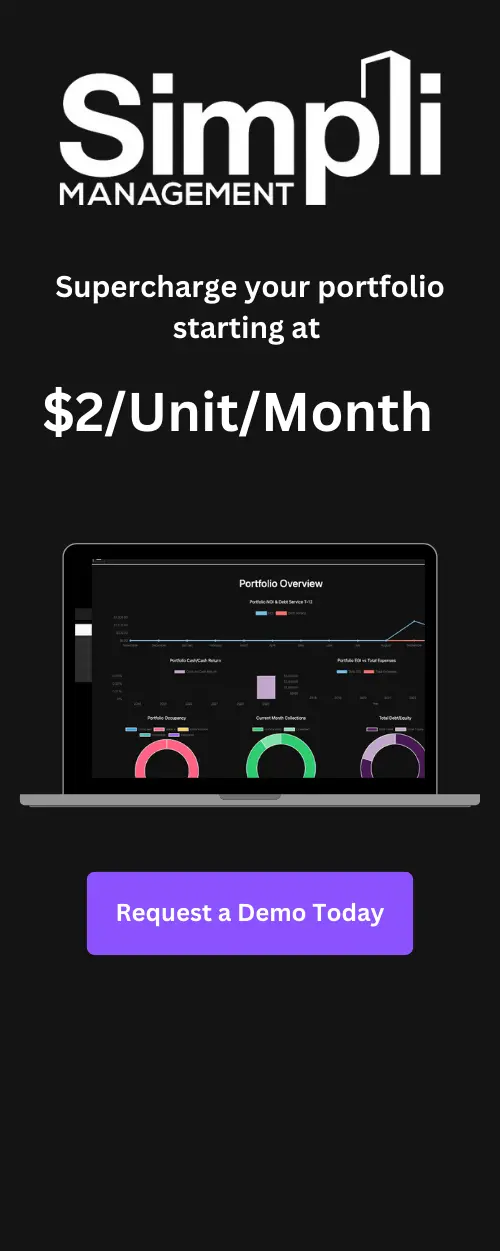Overview
Launching a property management company can be one of the most rewarding ventures in the real estate industry. With the market poised for significant growth and technology revolutionizing how day-to-day operations are handled, there’s never been a better time to start your own business.
This comprehensive guide covers everything from industry fundamentals to legal requirements, robust business planning, financial setup, marketing strategies, and operational best practices. You’ll also learn how modern property management software—like our very own Simpli Management platform—can streamline your operations and give you a competitive edge.
Industry Overview
The property management industry is booming, fueled by growing rental markets, rising property values, and increased demand for professional management. With forecasts predicting the market to continue expanding into the billions, both seasoned real estate investors and new entrepreneurs have a lucrative opportunity.
Whether you’re managing residential units, commercial spaces, or HOA properties, understanding the broader market trends and challenges is key. Our guide not only details practical steps but also contextualizes your venture within a dynamic industry.
Key Takeaways: Stability in rental income, multiple revenue streams, and the advantage of leveraging cutting-edge technology.
Assessing Your Readiness
Before diving into the property management business, it’s critical to evaluate your own qualifications. At a minimum, you’ll need strong communication, organizational, and financial skills. While a high school diploma can suffice, further education in business, real estate, or property management gives you a competitive edge.
Self-Assessment Checklist:
- Have you developed essential skills like problem-solving and financial literacy?
- Are you ready to handle both the administrative and operational aspects of managing properties?
- Have you considered specializing in a niche (residential, commercial, HOAs, or vacation rentals) to refine your expertise?
Taking the time to answer these questions honestly will help you build a solid foundation for your venture.
Legal Considerations & Licensing Requirements
Compliance with local, state, and federal regulations is non-negotiable when starting a property management company. Research your state’s specific requirements—some states require a real estate broker’s license, while others may have additional certifications or permits.
Steps to Ensure Compliance:
- Consult with a real estate attorney to understand local laws and licensing needs.
- Obtain all necessary licenses, such as a property management license or a real estate broker’s license.
- Decide on your business structure (LLC, S-Corp, or C-Corp) to protect personal assets and optimize tax benefits.
A strong legal foundation not only protects your interests but also builds trust with property owners and tenants.
Creating a Robust Business Plan
A detailed business plan is the blueprint for your success. It should encompass an executive summary, market analysis, service offerings, organizational structure, and comprehensive financial projections.
Key Components to Include:
- Executive Summary: Outline your vision, mission, and goals.
- Market Analysis: Research and analyze your target audience, competitors, and local trends.
- Service Offerings & Pricing: Define your property management packages (from leasing to maintenance) and your fee structure.
- Financial Projections: Forecast revenue, expenses, and growth milestones.
Your business plan should also highlight how leveraging technology—like the Simpli Management platform—can enhance operational efficiency and drive success.
Organizing Your Finances & Accounting
Every successful business needs a solid financial structure. Start by setting realistic revenue goals, planning for expenses, and establishing proper accounting practices.
Financial Tips:
- Create segregated bank accounts for operating funds, owner deposits, and reserves.
- Implement an accounting system—whether traditional software or a cloud-based solution—to track all transactions.
- Plan for unexpected expenses by building a financial cushion into your budget.
Notably, property management software can simplify these tasks by automating rent collection, generating real-time reports, and ensuring transparent financial records.
Establishing Your Business Infrastructure
From business registration to setting up an office—virtual or physical—this phase is about laying the operational groundwork for your company.
Steps to Get Organized:
- Register your business, file for an EIN, and open a dedicated business bank account.
- Decide on an office setup that suits your needs; many new property managers start with a virtual office to reduce overhead costs.
- Establish internal processes for administrative tasks, client communication, and vendor management.
Investing time in operational efficiency early on is key to scaling your business.
Building and Managing Your Team
Whether you start solo or build a team from day one, defining roles and building a strong company culture is essential.
Key Considerations:
- Determine which roles are critical—property managers, administrative staff, maintenance coordinators, and sales representatives.
- Decide on full-time hires versus outsourcing specific functions based on your budget and growth strategy.
- Focus on employee development and foster a culture of excellent customer service and accountability.
A cohesive team not only improves efficiency but also projects professionalism to property owners and tenants alike.
Marketing and Branding Your Business
With your business structure in place, the next step is to attract clients. A strong brand and a strategic marketing plan are vital for growing your portfolio.
Strategies to Consider:
- Develop a compelling brand identity that communicates your unique value proposition.
- Invest in a professional website optimized for search engines and mobile users.
- Utilize content marketing, social media, and local networking events to build your reputation.
- Highlight your use of technology—such as Simpli Management—to show prospects how you streamline property management tasks.
Client Acquisition and Onboarding
Finding and retaining clients is the lifeblood of your business. A systematic approach to client acquisition—from lead generation to contract signing—will set you apart from the competition.
Client Acquisition Steps:
- Leverage both online and offline channels to generate quality leads.
- Develop clear pricing and service packages that are competitive yet profitable.
- Establish a streamlined onboarding process, incorporating digital contracts and electronic signatures.
- Build trust through transparency and excellent communication from the first contact onward.
Enhancing the Resident Experience
A great resident experience not only increases tenant retention but also reflects positively on your management skills. Focus on clear communication, prompt maintenance service, and community building.
Best Practices Include:
- Implementing online portals for rent payments, maintenance requests, and resident feedback.
- Conducting regular property inspections and addressing issues proactively.
- Using technology to send timely notifications and updates to residents.
Daily Operations and Compliance
Effective property management is an ongoing process that requires adherence to safety standards, legal compliance, and efficient daily operations.
Key Areas to Focus On:
- Maintenance scheduling and vendor management to keep properties in top condition.
- Ensuring compliance with local housing laws, fair housing regulations, and building codes.
- Tracking performance metrics with regular financial and operational reports.
Case Studies and Success Stories
Real-life examples of successful property management startups illustrate the power of a well-planned strategy. Many entrepreneurs have built thriving businesses by combining traditional management practices with modern technology.
Examples:
- A boutique property management firm that leveraged a cloud-based platform to streamline rent collection, resulting in reduced vacancies and higher owner satisfaction.
- An independent property manager who expanded their portfolio rapidly by developing a niche in multifamily properties and building strong local partnerships.
Final Thoughts
Starting a property management company may seem daunting, but with careful planning, adherence to legal and financial best practices, and the right technological tools, your venture can thrive in a growing market.
From creating a robust business plan and assembling a dedicated team to leveraging marketing strategies and advanced property management software, every step you take builds a stronger foundation for success.
At Simpli Management, we empower property managers with an integrated platform that automates rent collection, streamlines maintenance requests, and offers real-time financial reporting. Our goal is to help you focus on growth while we handle the operational complexities.

